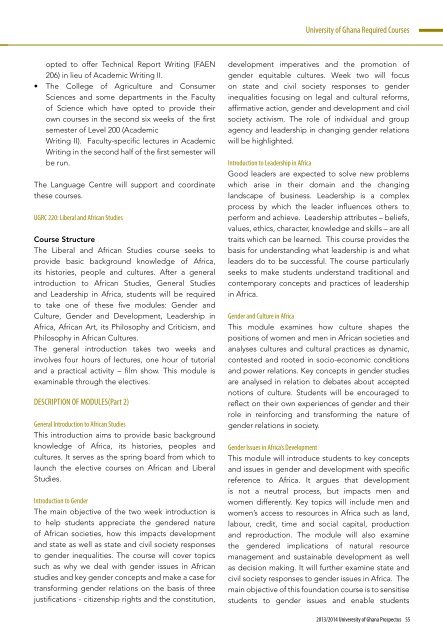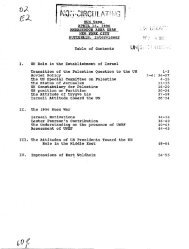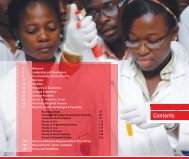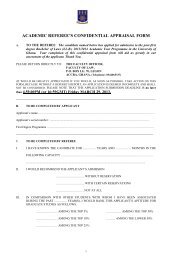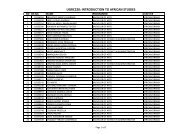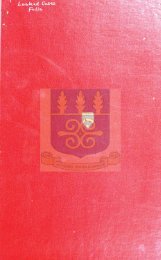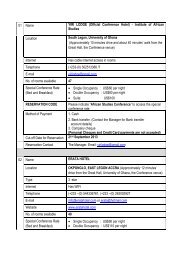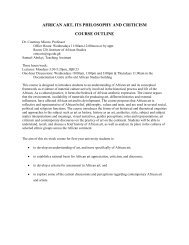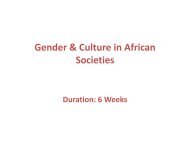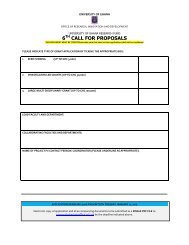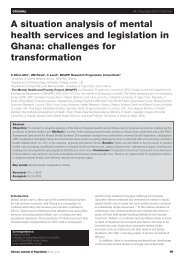General Pages - University of Ghana
General Pages - University of Ghana
General Pages - University of Ghana
Create successful ePaper yourself
Turn your PDF publications into a flip-book with our unique Google optimized e-Paper software.
<strong>University</strong> <strong>of</strong> <strong>Ghana</strong> Required Courses<br />
opted to <strong>of</strong>fer Technical Report Writing (FAEN<br />
206) in lieu <strong>of</strong> Academic Writing II.<br />
• The College <strong>of</strong> Agriculture and Consumer<br />
Sciences and some departments in the Faculty<br />
<strong>of</strong> Science which have opted to provide their<br />
own courses in the second six weeks <strong>of</strong> the first<br />
semester <strong>of</strong> Level 200 (Academic<br />
Writing II). Faculty-specific lectures in Academic<br />
Writing in the second half <strong>of</strong> the first semester will<br />
be run.<br />
The Language Centre will support and coordinate<br />
these courses.<br />
UGRC 220: Liberal and African Studies<br />
Course Structure<br />
The Liberal and African Studies course seeks to<br />
provide basic background knowledge <strong>of</strong> Africa,<br />
its histories, people and cultures. After a general<br />
introduction to African Studies, <strong>General</strong> Studies<br />
and Leadership in Africa, students will be required<br />
to take one <strong>of</strong> these five modules: Gender and<br />
Culture, Gender and Development, Leadership in<br />
Africa, African Art, its Philosophy and Criticism, and<br />
Philosophy in African Cultures.<br />
The general introduction takes two weeks and<br />
involves four hours <strong>of</strong> lectures, one hour <strong>of</strong> tutorial<br />
and a practical activity – film show. This module is<br />
examinable through the electives.<br />
DESCRIPTION OF MODULES(Part 2)<br />
<strong>General</strong> Introduction to African Studies<br />
This introduction aims to provide basic background<br />
knowledge <strong>of</strong> Africa, its histories, peoples and<br />
cultures. It serves as the spring board from which to<br />
launch the elective courses on African and Liberal<br />
Studies.<br />
Introduction to Gender<br />
The main objective <strong>of</strong> the two week introduction is<br />
to help students appreciate the gendered nature<br />
<strong>of</strong> African societies, how this impacts development<br />
and state as well as state and civil society responses<br />
to gender inequalities. The course will cover topics<br />
such as why we deal with gender issues in African<br />
studies and key gender concepts and make a case for<br />
transforming gender relations on the basis <strong>of</strong> three<br />
justifications - citizenship rights and the constitution,<br />
development imperatives and the promotion <strong>of</strong><br />
gender equitable cultures. Week two will focus<br />
on state and civil society responses to gender<br />
inequalities focusing on legal and cultural reforms,<br />
affirmative action, gender and development and civil<br />
society activism. The role <strong>of</strong> individual and group<br />
agency and leadership in changing gender relations<br />
will be highlighted.<br />
Introduction to Leadership in Africa<br />
Good leaders are expected to solve new problems<br />
which arise in their domain and the changing<br />
landscape <strong>of</strong> business. Leadership is a complex<br />
process by which the leader influences others to<br />
perform and achieve. Leadership attributes – beliefs,<br />
values, ethics, character, knowledge and skills – are all<br />
traits which can be learned. This course provides the<br />
basis for understanding what leadership is and what<br />
leaders do to be successful. The course particularly<br />
seeks to make students understand traditional and<br />
contemporary concepts and practices <strong>of</strong> leadership<br />
in Africa.<br />
Gender and Culture in Africa<br />
This module examines how culture shapes the<br />
positions <strong>of</strong> women and men in African societies and<br />
analyses cultures and cultural practices as dynamic,<br />
contested and rooted in socio-economic conditions<br />
and power relations. Key concepts in gender studies<br />
are analysed in relation to debates about accepted<br />
notions <strong>of</strong> culture. Students will be encouraged to<br />
reflect on their own experiences <strong>of</strong> gender and their<br />
role in reinforcing and transforming the nature <strong>of</strong><br />
gender relations in society.<br />
Gender Issues in Africa’s Development<br />
This module will introduce students to key concepts<br />
and issues in gender and development with specific<br />
reference to Africa. It argues that development<br />
is not a neutral process, but impacts men and<br />
women differently. Key topics will include men and<br />
women’s access to resources in Africa such as land,<br />
labour, credit, time and social capital, production<br />
and reproduction. The module will also examine<br />
the gendered implications <strong>of</strong> natural resource<br />
management and sustainable development as well<br />
as decision making. It will further examine state and<br />
civil society responses to gender issues in Africa. The<br />
main objective <strong>of</strong> this foundation course is to sensitise<br />
students to gender issues and enable students<br />
2013/2014 Univeresity <strong>of</strong> <strong>Ghana</strong> Prospectus 55


